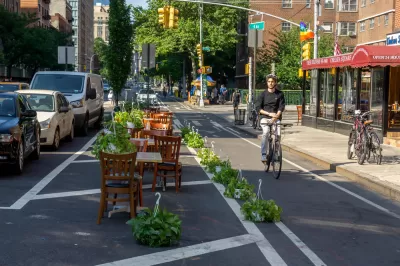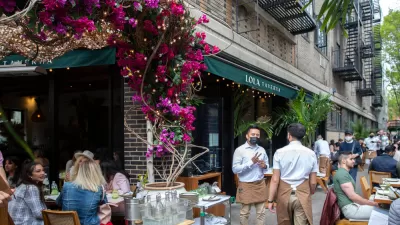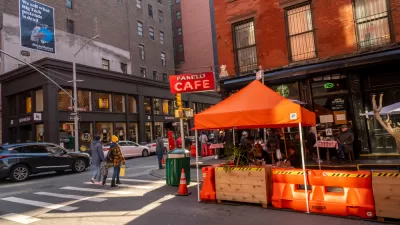As emergency ordinances passed during the pandemic are set to expire, county officials will consider making some pandemic dining accommodations permanent.

After expediting the permitting process for outdoor dining during the pandemic, Arlington County wants to "explore ways to make it easier for restaurants to establish or expand outdoor dining after the pandemic ends," reports Joe DeVoe. According to a county report, "staff will be looking to see if some aspects of the program could be worked into the regular outdoor seating approval process."
The report adds, "staff will be working to commence a strategic exploration of whether certain flexibilities provided as part of the TOSA program initiated in response to the COVID-19 emergency should be incorporated into established regulatory provisions for outdoor dining." The process "will have a robust engagement element and would also include public hearings prior to the County Board’s consideration of any recommended policy or regulatory changes that might result from the study."
"When the county passed a continuity of governance emergency ordinance last spring to keep government and business operations afloat, it said any flexibility allowed by the ordinance, such as TOSAs, would expire six months after the declared end of the emergency. But in reality, the document’s section on TOSAs said they expire with the declared end of the emergency." Now, Kate Bates, President and CEO of the Arlington Chamber of Commerce, urges the county "to get cracking on the study of permanent options" so restaurant owners can confidently invest in outdoor dining infrastructure for the future.
FULL STORY: County to Study Ways of Making Temporary Outdoor Seating Areas Permanent

Planetizen Federal Action Tracker
A weekly monitor of how Trump’s orders and actions are impacting planners and planning in America.

San Francisco's School District Spent $105M To Build Affordable Housing for Teachers — And That's Just the Beginning
SFUSD joins a growing list of school districts using their land holdings to address housing affordability challenges faced by their own employees.

The Tiny, Adorable $7,000 Car Turning Japan Onto EVs
The single seat Mibot charges from a regular plug as quickly as an iPad, and is about half the price of an average EV.

Seattle's Plan for Adopting Driverless Cars
Equity, safety, accessibility and affordability are front of mind as the city prepares for robotaxis and other autonomous vehicles.

As Trump Phases Out FEMA, Is It Time to Flee the Floodplains?
With less federal funding available for disaster relief efforts, the need to relocate at-risk communities is more urgent than ever.

With Protected Lanes, 460% More People Commute by Bike
For those needing more ammo, more data proving what we already knew is here.
Urban Design for Planners 1: Software Tools
This six-course series explores essential urban design concepts using open source software and equips planners with the tools they need to participate fully in the urban design process.
Planning for Universal Design
Learn the tools for implementing Universal Design in planning regulations.
Smith Gee Studio
City of Charlotte
City of Camden Redevelopment Agency
City of Astoria
Transportation Research & Education Center (TREC) at Portland State University
US High Speed Rail Association
City of Camden Redevelopment Agency
Municipality of Princeton (NJ)





























